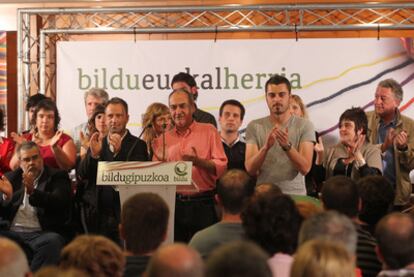Police link ETA with creation of Bildu alliance
Prosecutors to use report to keep coalition off May 22 ballot
Despite the fact that the majority of the candidates presented by the Bildu electoral alliance appear to have no direct links to the outlawed Batasuna party, police investigators have concluded in a report that ETA is behind the newly formed coalition.
The report has been handed over to the Attorney General's Office, which is expected to present it to the Supreme Court next week to try to prohibit Bildu from fielding candidates in upcoming local elections on May 22. Bildu was formed this month as an electoral alliance with the legitimate Basque abertzale radical left parties, Eusko Alkartasuna (EA) and Alternatiba, after the Supreme Court on April 7 banned a newly formed party, Sortu, from presenting contenders because of its links to Batasuna and ETA.
"One of the objectives of a proposal designed by ETA in 2008 and adopted by Batasuna in 2009, to create an alliance of leftist political parties that support independence with electoral ambitions, was accomplished - at least during its first phase - with the signing of a strategic accord between Batasuna and Eusko Alkartasuna in June 2010," reads the report. "This proposal was being pushed by ETA and undertaken by members of Batasuna's 'steering committee,' who are not in custody."
The police say that Rufino Echeberria and José Luis Moreno Sagües signed the accord on behalf of Batasuna.
"This common objective to form a 'pro-independence alliance' similar to the French model Euskal Herria Bai was blocked when the Supreme Court rejected Sortu's registration as a party. It was then decided to list those candidates as 'independents,' from the radical left," the report states. "The Eusko Alkartasuna and Alternatiba party assemblies met in Bilbao and decided to support an agreement drafted by their executive committees to build an electoral coalition in the Basque Country districts for abertzale 'independents,' who in reality are Batasuna candidates."
Yet Bildu has been careful to leave out anyone with obvious direct links to Batasuna. On Wednesday, the alliance published the lists of its candidates running for local offices on 258 slates in the Basque Country and Navarre. Examination of the contenders, conducted by EL PAÍS, shows that there is practically no one included who has been banned by the Supreme Court in previous elections.
Only two contenders have some connection to outlawed parties. Endika Jayo Bilbao, running for mayor in the town of Mañaria, Vizcaya, was on the 2007 election slate for the now-outlawed National Basque Action (ANV) party. The other person is José María Aracama, number five on the slate in Zegama, Guipúzcoa, who was part of the Sozialista Abertzaleak four years ago.
In 2007, the Supreme Court banned the 246 Sozialista Abertzaleak slates just before the municipal races got underway that year. The justices had ruled that "without a doubt" the Sozialista Abertzaleak was indeed Batasuna in disguise. Under the Law of Political Parties, Batasuna was outlawed in 2003 and the ANV was banned for four years.
On Wednesday, the government announced that it had given the Attorney General's Office the go-ahead to present a case against Bildu - as it did with the recently formed Sortu party - to block its candidates from running in upcoming local races in the Basque Country and Navarre.
EL PAÍS found that a large majority of the candidates running on the Bildu tickets, especially those whose names appear at the top of the slates, are members of the abertzale left but have never run before in any election. In fact, in places such as Vizcaya, old political warhorses who traditionally run for office in every election are now being replaced with fresh Bildu faces.
This is the first time that the abertzale left have fielded nearly all candidates who have no known links to illegal parties. During the 2003 elections, the radical left presented 194 slates, with no less than 716 candidates who ran four years beforehand with the now-banned Euskal Herritarrok party. The Supreme Court prohibited these candidates from running.
The abertzale again tried to repeat the same strategy in 2007 when more than 600 pro-Batasuna candidates showed up on the ANV and Sozialista Abertzaleak lists. On that occasion the top court banned them after determining the two political organizations were Batasuna spinoffs.
A perusal of the slates also reveals some electoral curiosities. For instance, in the municipality of Irura in Guipúzcoa, there isn't a single party that is fielding opposition candidates, and in nearby Aduna, only the Popular Party (PP) has presented an opposition slate.

Tu suscripción se está usando en otro dispositivo
¿Quieres añadir otro usuario a tu suscripción?
Si continúas leyendo en este dispositivo, no se podrá leer en el otro.
FlechaTu suscripción se está usando en otro dispositivo y solo puedes acceder a EL PAÍS desde un dispositivo a la vez.
Si quieres compartir tu cuenta, cambia tu suscripción a la modalidad Premium, así podrás añadir otro usuario. Cada uno accederá con su propia cuenta de email, lo que os permitirá personalizar vuestra experiencia en EL PAÍS.
¿Tienes una suscripción de empresa? Accede aquí para contratar más cuentas.
En el caso de no saber quién está usando tu cuenta, te recomendamos cambiar tu contraseña aquí.
Si decides continuar compartiendo tu cuenta, este mensaje se mostrará en tu dispositivo y en el de la otra persona que está usando tu cuenta de forma indefinida, afectando a tu experiencia de lectura. Puedes consultar aquí los términos y condiciones de la suscripción digital.








































